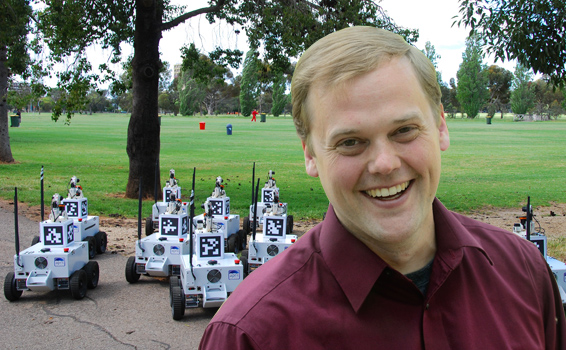Edwin Olson Awarded DARPA Young Faculty Award

 Enlarge
Enlarge
Prof. Edwin Olson has been awarded a Young Faculty Award from the Defense Advanced Research Projects Agency (DARPA) for his research in the area of autonomous intelligent robotics.
His research project, “Mutual Modeling for Human/Robot Teaming with Minimal Communications,” proposes to formulate, develop, and evaluate a novel multi-agent coordination framework in which robots explicitly model the intent of their human and robot teammates, with the intention of simplifying human oversight of teams of cooperating robots and speeding responsiveness in applications such as urban reconnaissance, search and rescue, security/patrol, and surveillance.
The project will radically reformulate inter-agent communication beyond current state-of-the-art systems that do not make optimal use of radio bandwidth due to redundant/unnecessary transmissions. Each robot to maintain a model of its teammates that allows it to predict the actions of another robot under multiple scenarios, including scenarios in which a specific item of data has been transmitted via radio. The resulting prediction of behavior allows a robot to objectively rate the value of that information and prioritize its transmissions based on their importance.
More information regarding the award is available in DARPA’s press release: Elite Group of Young Scientists Embark on DARPA Research Efforts.
Prof. Edwin Olson received his PhD in Computer Science from the Massachusetts Institute of Technology in 2008 for his work in robust robot mapping. During his time as a PhD student, he was a core member of their DARPA Urban Challenge Team which finished the race in 4th place. Upon joining the Michigan faculty in 2008, he created the APRIL robotics lab, which studies Autonomy, Perception, Robotics, Interfaces, and Learning. His active research projects include applications for explosive ordinance disposal, search and rescue, railway inspection and safety, and automobile autonomy and safety.
In 2010, he led the winning team in the MAGIC 2010 competition by developing a team of 14 robots that semi-autonomously explored and mapped a large-scale urban environment. For winning, the U.S. Department of Defense awarded him $750,000. He was named one of Popular Science’s “Brilliant Ten” in September, 2012.
He is active in both the open source software community as one of the original developers of the message-passing system LCM, and the creator of the OrcBoard robotics controller. Much of his current software is available under open source licenses. He has taught Introduction to Artificial Intelligence (EECS 492), Autonomous Robotics Laboratory (EECS 498), Mobile Robotics: Methods and Algorithms (EECS 568), and Algorithms for Robots (EECS 598).
About the DARPA Young Faculty Award
The DARPA Young Faculty Award program is intended to identify and engage rising research stars in junior faculty positions in academia, and provide high-impact funding in order to develop their research ideas in the context of Department of Defense needs. DARPA is looking for research focusing on innovations that will enable revolutionary advances in selected areas. High-risk/high-payoff ideas are strongly encouraged.
 MENU
MENU 
